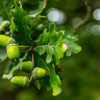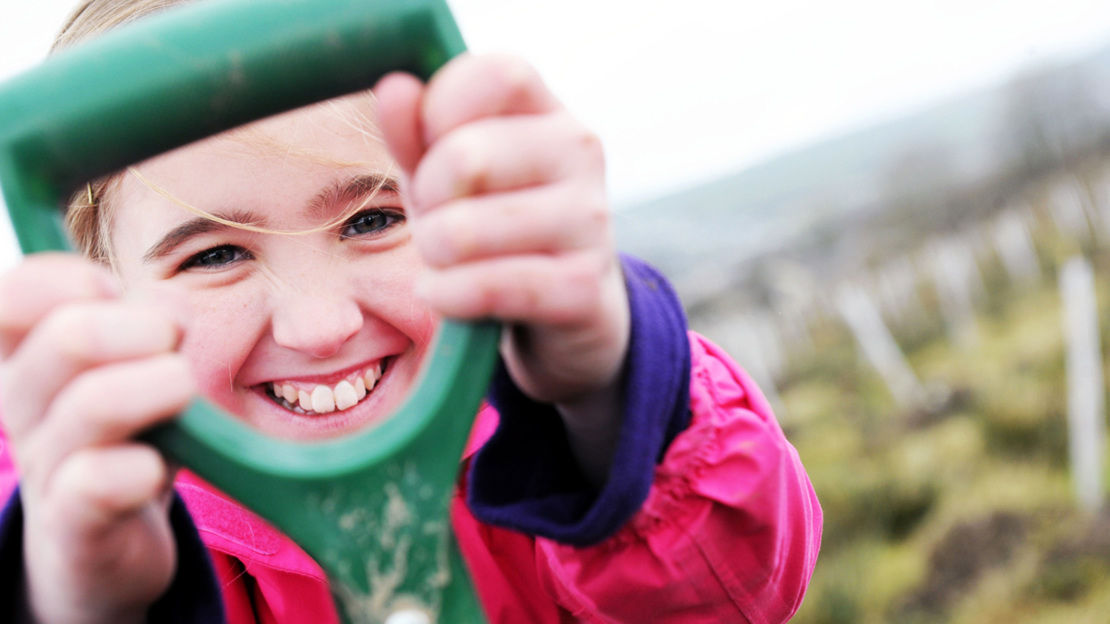Children's author Michael Morpurgo backs project bringing city children into nature and farming

The UK's leading woodland conservation charity
Children’s author Michael Morpurgo – known for penning books such as Birthday Duck and War Horse – is involved in a real life story of children, farming and nature on a farm in Devon.
The Woodland Trust is working with Farms for City Children, a charity founded by Michael and his wife, Clare, on a unique 'roundel' scheme - connecting city children with nature and farming.
These roundels are like little powerful pockets of nature – rather like stepping stones of biodiversity- that are dotted across a field. They are temporary enclosures containing trees and shrubs that will, in time, allow cattle access to forage and browse, whilst also finding shelter.
Each will be ‘adopted’, planted and cared for by a visiting school, and the hope is that the children will feel connected to a piece of natural habitat of their own making throughout their adult life and go on to inspire other children with their story.

Eleanor Lewis, outreach manager at the Woodland Trust, which provided the trees and know-how, said:
“This is a really special project. Even though we increasingly know the vital role trees and shrubs play for both habitat and animal welfare, it can be tricky to integrate them into farming systems. Rather than planting isolated trees which is expensive due to the protective fencing, by grouping trees and shrubs, these roundels create a more immediate canopy, for a significantly lower price per tree, whilst also providing numerous benefits including shade, shelter and food.
“It’s great that we can involve kids with such an innovative project. There can be a real disconnect between people and nature. This project aims to break down those barriers. This project will provide a place for children to connect with nature and have pride in what they have created. In time we hope it inspires them to develop a love for the natural world which is so important when you consider the bigger issues such as climate change and biodiversity loss.”
Clare Morpurgo developed the charity with her writer husband Michael, to give children chance to experience life on a farm.
Michael said:
“To walk through a wood, to listen and to see the wind in the trees, to touch the bark of a tree, and to plant a tree, is to join hands with nature, to feel a deep sense of belonging. Many of the 100,000 city children who have come for a week of farming, of living in the countryside, have felt for the first time that precious connection between us and the world about us. Once felt it is never forgotten. A seed is planted.”
Donna Marie Edmonds, chief executive of Farms for City Children, said:
“This is something very tangible for a young person. To know that they are doing good for their planet, for the farm, for the animals, for the nature that exists all around, and for the future generations of children who will make a visit to the charity from that same school community - that is something very special. You are helping us to create legacy impact. This might just be the activity completed on the farm that sets a young person on a future path that brings them into a career in agriculture or conservation.”
Planting started at Nethercott Farm, near Winkleigh, in January.
Adam Bratt, farm operations manager said:
“I am hopeful that establishing trees and specifically wood pasture habitat on our farm will benefit our livestock, local biodiversity and have a lasting impact on our visiting young people. Working with Mick from the Woodland Trust and the Trees for Your Farm project team has allowed us to receive the technical and financial support to trial an innovative way of establishing trees and we are excited to see the benefits of this project develop over time!”
Roundels are created around a central tree which will develop into a broad, open crowned feature of the farm over time, each with surrounding shrubs which will effectively create substantial ‘instant’ habitat in the space that the tree will eventually occupy in 75 to 100 years.
It can be a challenge integrating trees on farms at a reasonable cost. These are relatively simple to plant, deliver multiple benefits over a long period of time, and can be easily replicated and adjusted to suit soil types, farm outputs and variation of livestock.
They allow cattle to extend their range, offer feed options and provide an ‘island’ or ‘stepping stone’ for wildlife across otherwise open areas. There are other benefits, such as providing a source of pollen and berries for wildlife and firewood, charcoal or woodchip to benefit farm enterprises.
The Woodland Trust is funding the trees for the project which is part of its Trees for Your Farm project, backed by Sainsburys. All trees are sourced and grown in the British Isles via the Woodland Trust’s UKISG scheme.
Notes to editors
For enquiries please contact media@woodlandtrust.org.uk or 0330 333 5313.
About the Woodland Trust
The Woodland Trust is the largest woodland conservation charity in the UK. It has over 500,000 supporters. It wants to see a UK rich in native woods and trees for people and wildlife.
The Trust has three key aims:
- protect ancient woodland, which is rare, unique and irreplaceable
- restore damaged ancient woodland, bringing precious pieces of our natural history back to life
- plant native trees and woods with the aim of creating resilient landscapes for people and wildlife.
Established in 1972, the Woodland Trust now has over 1,000 sites in its care covering approximately 29,000 hectares. Access to its woods is free so everyone can benefit from woods and trees.
About Farms for City Children
Through a programme of food, farming, and outdoor learning activities, every year over 3,000 under-served children and young people benefit from a five-day residential stay with Farms for City Children at one of its three heritage farms. These young people, from the most deprived areas of England and Wales, navigate their formative years through barriers and challenges that prevent them having meaningful access to the natural world and opportunities for personal development.
The charity works to address these inequalities by giving access to nature and the countryside, and by providing a levelling-up education and wellbeing agenda that enables young people to grow and develop valuable transferable life skills and core values.

